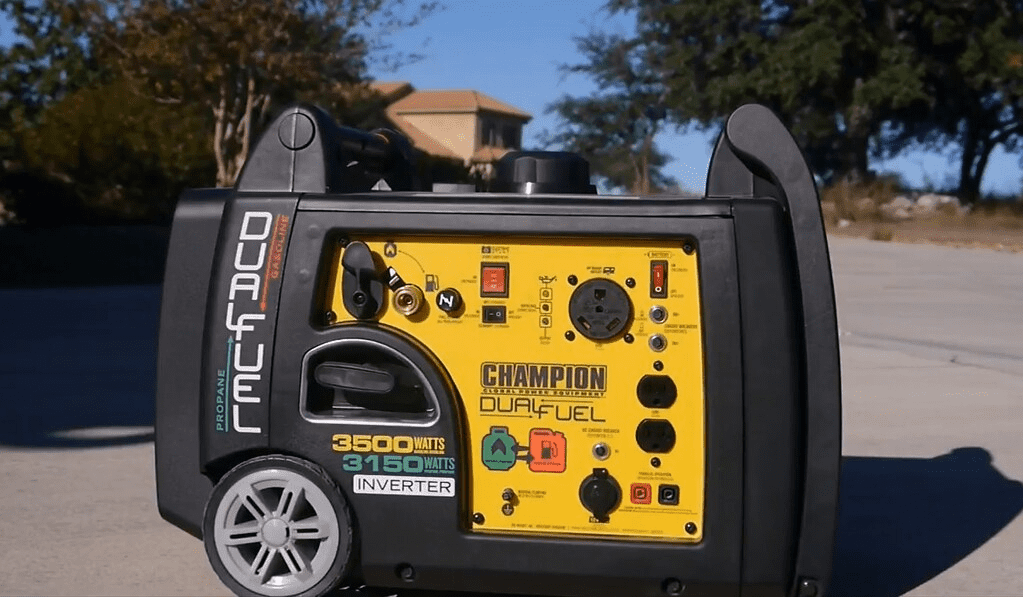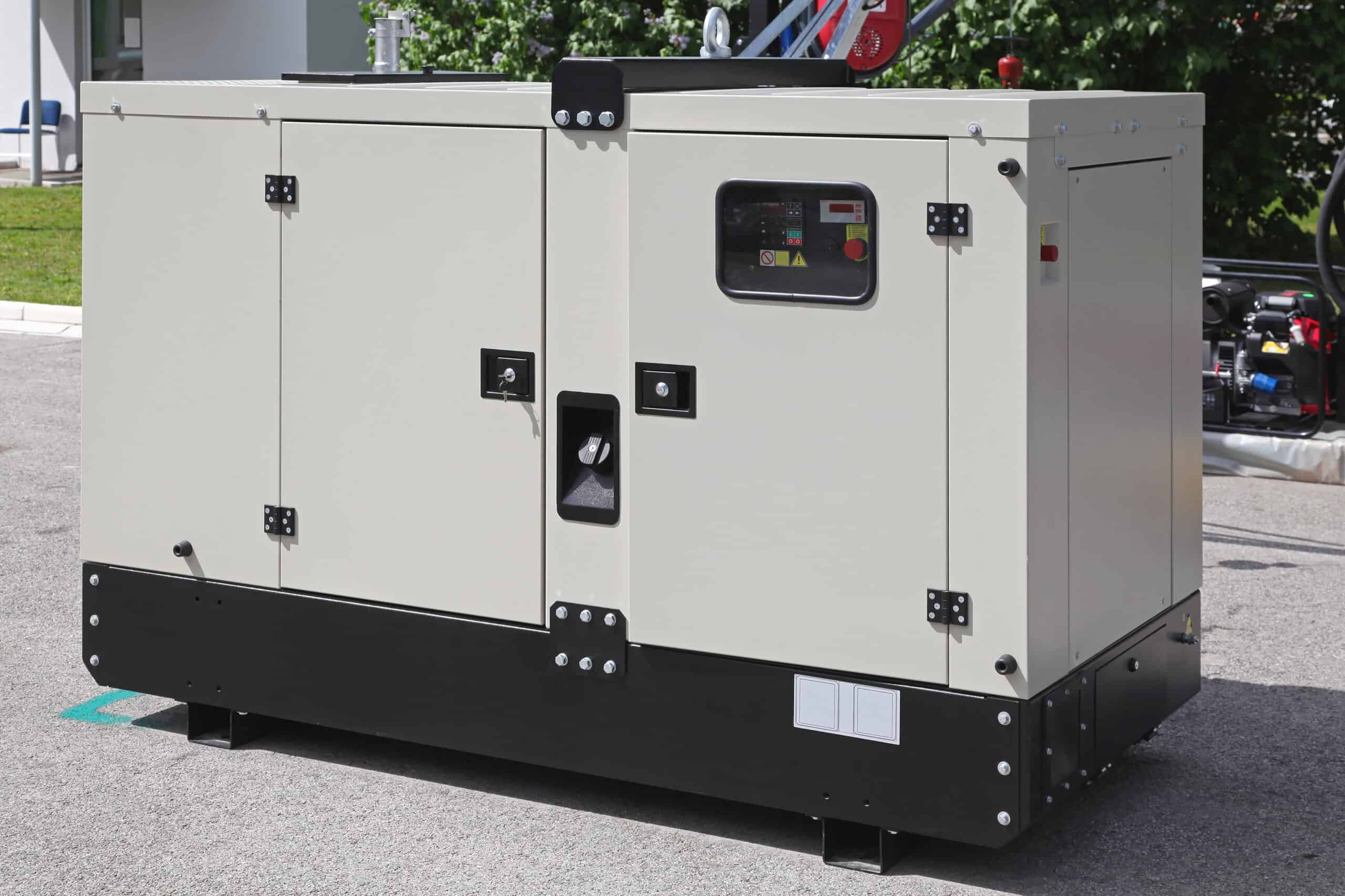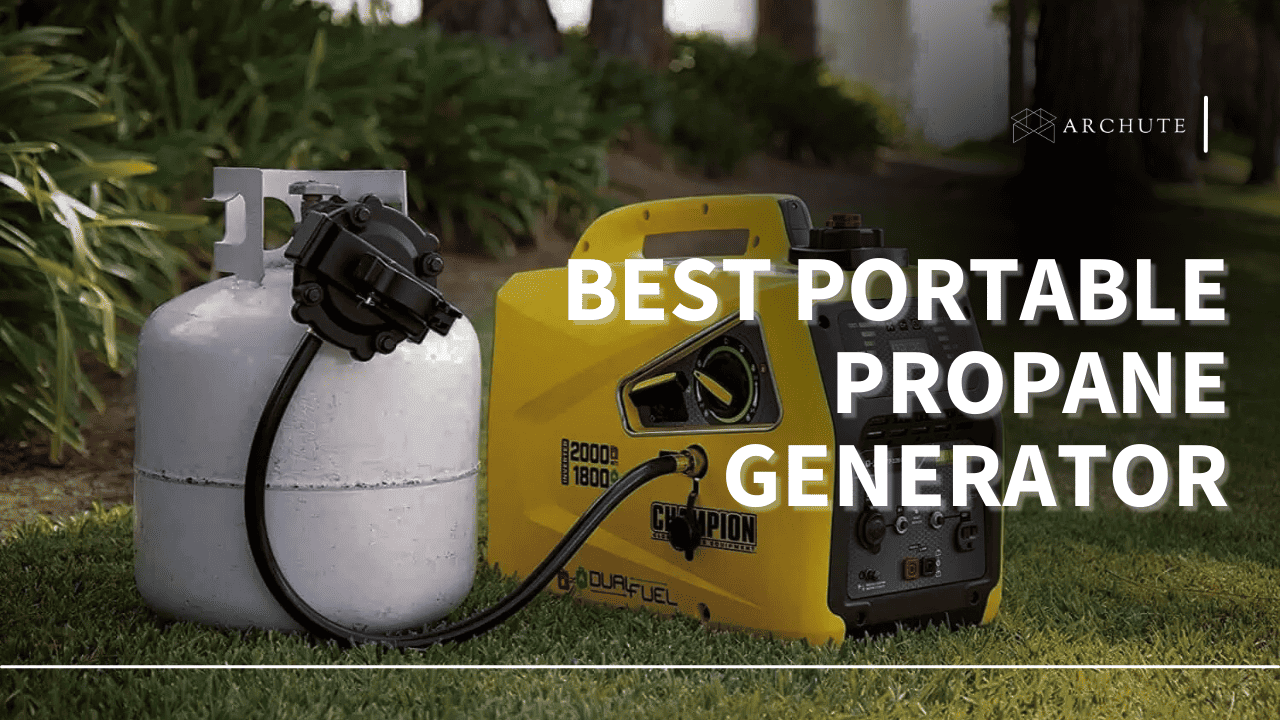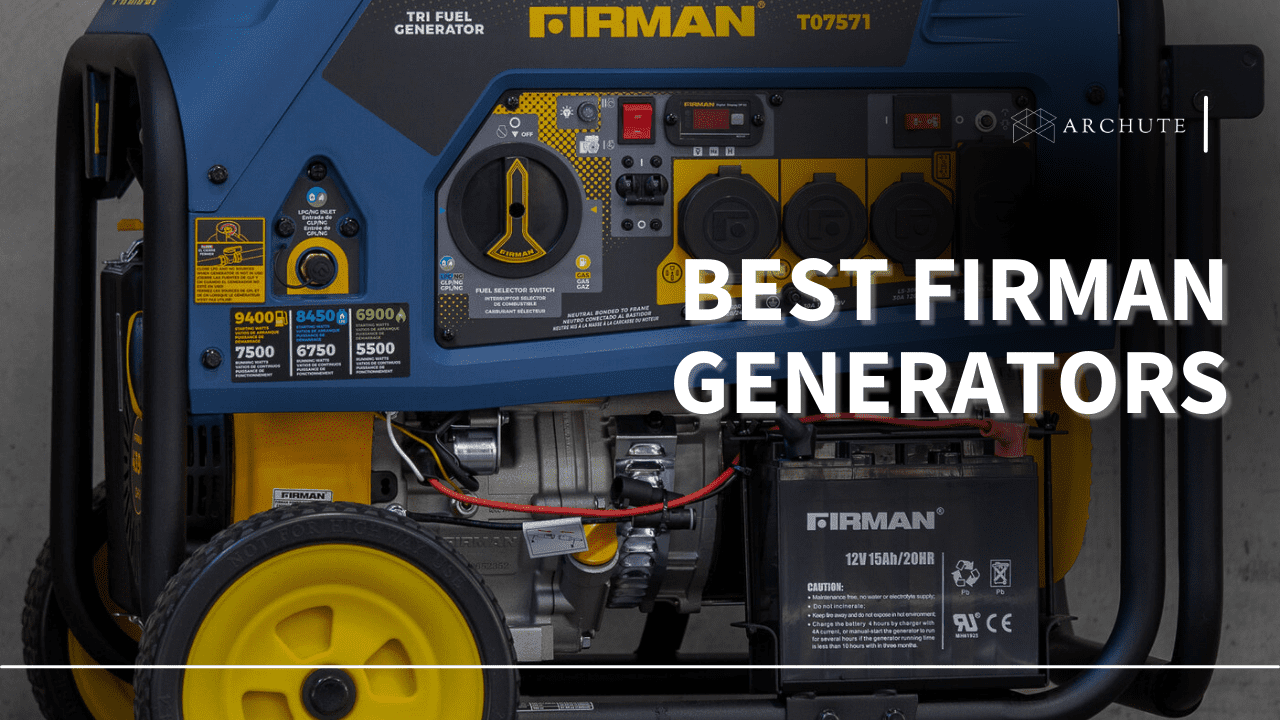If you are big on camping off-grid or dry camping in your RV, you already know the immense value of having a steady supply of power. Instant and continuous power ensures that you can run an air conditioner, refrigerator and other small 110 volt electronics, like a TV, microwave or coffee pot in your house on wheels. On this account, we have drawn up an extensive guide on the best generator for RV to help make your mobile home fully self-contained and livable in almost all camping conditions.
How Does a Generator for RV Work?
A generator essentially converts mechanical energy to electrical energy. As the engine turns, it supplies mechanical energy to the alternator, where it's transformed into electricity, working pretty much the same way as a vehicle's alternator.
In an RV, the alternator has a diode pack that converts the AC output to DC. The DC output charges the starter battery as well as leisure batteries using either a B2B (battery to battery) charger or a split charge relay. Therefore, an RV generator's primary purpose is to output AC power, although several models have a DC outlet too.
Can a Portable Generator Run Your RV?
Yes, but that depends on whether the wattage is high enough. The main thing to keep in mind is that you don't have to run all your appliances and devices at once. That means you can even use a lower-watt generator if you're keeping a keen eye on your power usage.
What Size Generator Works for Your RV?
Power output is a central factor when you're looking at the best RV generators. Most manufacturers indicate output in two figures:
- Startup/Surge watts - indicate the maximum power produced by the generator in a short burst. Some appliances, such as AC units and refrigerators, require a lot of power to get going but much less to keep running.
- Running/Continuous/Rated watts - indicate the power produced by the generator continuously. This is typically the rated value that's included in most model names.
Therefore, you have to work out the total simultaneous power load you need from a generator to determine what size best meets your needs. It's probably best to have a bit of wiggle room too.
If you only have a handful of fairly small AC appliances, you can probably get by with a standard 2,000-3,000 watt RV portable generator. However, if you need more power, you'll need to look at portable RV generators with a rating of up to 5,500 watts, and occasionally even more.
With several competing generator brands at your behest, we'd like to help you find a unit that best fits your rig. Here's our top 10 list for the best generator for RV:
Which is the best generator for RV?
Rank | Product Image | Brand Name | Link |
|---|---|---|---|
1 | |||
2 | |||
3 | |||
4 | |||
5 | |||
6 | |||
7 | |||
8 | |||
9 | |||
10 |
1. DuroMax XP12000EH Generator
- Powerful DuroMax Engine: the XP12000EH is powered by a DuroMax,...
- Dual fuel technology: the ability to run on propane or gasoline...
- Plenty of power: with 12,000 starting watts and 9, 500 running...
- Maximum power: with DuroMax MX2 technology, get the maximum power...
- Powering everyone anywhere: like all DuroMax generators, the...
DuroMax is well known for building highly powerful RV generators ideal for large-sized campers. The XP12000EH has a remarkably high 12000W power output rating, thanks to the large 457CC engine capacity. It's certainly the best option for heavy-duty usage.
Other than sheer power, this RV generator comes with a solid build that assures you of an extended lifespan. It's also backed by a 3-year warranty if any issues come about. Just as important, the unit is approved for safety in 50 states, so you can use it virtually anywhere.
However, this portable RV generator is the most expensive of all the generators we've reviewed, which might lock out some users.
Pros:
Cons:
2. Durostar DS4000S Portable Generator
- Plenty of Power – With 4,000 peak watts and 3,300 running...
- Powerful Engine – The DuroStar 208cc OHV engine is a workhorse...
- Low Oil Shutoff – Protects your investment by automatically...
- Power Panel – The power panel includes a selection of outlets...
- Complies with Emissions Standards – All DuroStar generators are...
DuroStart is a DuroMax sub-brand that focuses more on making affordable RV generators rather than powerful ones built by the parent company. The DS4000S is a budget portable generator that offers great value for your money. For starters, it has a decent 4000W power rating, thanks to the 208 CC engine.
It features a recoil start method, as you would expect from a budget option. Just like almost all generators from DuroMax, it's backed by a 3-year long warranty. However, the build quality could have been better, but it's hard to complain at the given price point.
Pros:
Cons:
3. Westinghouse iGen4500 Portable Inverter Generator
- 3700 Rated Watts and 4500 Peak Watts at Less Than 3% THD –...
- Features a 5–20R 120V Duplex Household Outlet, an RV-Ready...
- Led Data Center: Rotating Digital Display Shows Fuel Level, Power...
- Extremely Quiet, Extremely Fuel Efficient: as Low as 52 dBA Noise...
- All Westinghouse Portable Generators are Functionally Tested in...
Westinghouse is a small RV generator brand, but it still offers attractive options to its users. The iGen4500 RV generator is well-suited for people looking for heavy-duty use. It has a 224CC engine capacity that produces a high 4500W power output.
It's arguably the quietest generator on the list, thanks to the quiet power technology. It also features an electric start. Additionally, this generator is CARB compliant, so you can rest assured of added safety when using it. It also comes with a 3-year warranty.
Pros:
Cons:
4. WEN 56380i Portable Inverter Generator
- Dimensions: 23.2" L x 18" W x 20.1" H | Weight: 99.2 lb
- EPA III and CARB Compliant
- 212cc 4-stroke OHV engine produces 3800 surge watts and 3400...
- Fuel shutoff maximizes the generator’s lifespan by using up the...
- Produces clean power to prevent damage to sensitive electronics...
WEN is widely known for including multiple features in its power tools, and the same translates to their inverter generators. The 56380i inverter generator has a 3800W power rating that will suit most users. On top of that, it has a robust build for extended durability.
This inverter generator features an electric start, as well as a fuel shut-off feature for better fuel efficiency. It has several ports that allow you to connect multiple appliances at the same time. Furthermore, it's quite silent, making it ideal to use in parks or the countryside.
Pros:
Cons:
5. Champion 3400-Watt Dual Fuel RV Generator
- Dual Fuel – Operate your 3400-watt portable generator right out...
- Convenient Electric Start with 3-Position Ignition Switch –...
- Ultra-Quiet Operation – 59 dBA is perfect for RVs, tailgating,...
- Clean Power for Sensitive Electronics – RV Ready with a 120V...
- Champion Support – Includes 3-year limited warranty with FREE...
Champion generators are a great option if you want a feature- and option-packed unit. The Champion Dual Fuel generator is extremely convenient as it runs on both gasoline and propane, giving you much-needed flexibility. It also has an inverter function that improves its ease of use.
This portable RV generator has a 196 CC gas engine that delivers 3400W power output. It uses a highly efficient four-stroke engine to reduce the amount of maintenance required over time. It also features an equally convenient electric start to save on time.
The Champion generator has a 3-year warranty and a lifetime guarantee of free technical support for added reliability.
Pros:
Cons:
6. Generac 7129 Inverter Generator -eh
- PowerRUSH Technology - Delivers over 50% more starting...
- Quiet inverter power - reduces sound emissions and provides...
- Easy to carry - compact & lightweight with built-in handle
- Truepower - clean power for sensitive electronics. ItemWeight:...
- USB outlets and parallel ready - connect 2 units together for...
Generac RV generators have a great reputation for their high efficiency; their units usually produce higher output for any given engine capacity. The 7129 is probably the most efficient on the market. A small 80 CC engine delivers a remarkable 3000W of output power.
It's small and compact construction makes it exceptionally portable. It also has a handle at the top to make it even easier to carry around. In addition, this gas-powered generator has multiple port for connecting several devices at once. And you also get a 3-year warranty.
Pros:
Cons:
7. Generac 7127 Portable Inverter Generator
- ULTRA-QUIET – 40% Quieter than Honda* Advanced inverter...
- Ideal for work or play - durable steel enclosure, clean inverter...
- 16% more power than Honda, Featuring power rush advanced...
- Digital smart lcd - digital wattage meter, run time remaining...
- USB ports - charge mobile devices including smartphones and...
If you're not looking to spend over the top for a portable generator, the Generac 7127 is an excellent option. This fuel-efficient generator comes with an economy mode that boasts over 14 hours of run time at 25% load capacity. That means it can run a 13,500 BTU RV AC unit quite comfortably.
This portable inverter generator is built for the modern world, sporting electrical outlets and USB ports. It also features easy-to-use controls, making operations simple and straightforward.
The only significant drawback is the heavy construction and the fact that it lacks wheels. This makes it harder to move from one point to another, but it certainly gets the job done once you're there.
Pros:
Cons:
8. Honda EU3000IS Portable Gas Generator
A Honda generator shouldn't come as a surprise with all the high-quality appliances under its name. The company has been building exceptionally quiet and easy-to-operate generators for decades. The EU3000IS is arguably one of their most powerful portable generators.
It's a 2800-watt gas generator that can run a 13,500 BTU air unit and still have enough power left to charge batteries. It's highly efficient, capable of running for 20 hours on just 3.4 gallons of gasoline. Furthermore, it can also run parallel to other generators.
It comes with a microprocessor to regulate power output so that your sensitive electronics are safe. This portable generator also features an electric start and a pull-start backup for added flexibility. Although the decibel levels aren't specified, this unit is pretty quiet, plus the onboard muffler helps keep the noise levels pretty low.
Pros:
Cons:
9. Generac 6866 iQ2000 Portable Generator
- AC Rated Output(Running/Starting): 1600/2000 Watts; AC Rated...
- PowerDial integrates start/run/stop functions into 1 easy-to-use...
- PowerBar monitors and displays wattage used; Electronic Fuel...
- Fuel Capacity: 1.06 Gallons; Runtime (50% - 25% Load): 5.7 - 7.7...
- Economy, Standard, and Turbo modes of operation saves fuel and...
The Generac 6866 makes it our list mainly for its price for value. You get a decent 1600-watt generator that can handle most loads for up to 6 hours at a very affordable price cost. Furthermore, the small profile means it's fairly lightweight and easy to carry around.
This RV generator can run a 10,000 BTU window-mounted air conditioner when necessary. It has a 7 hour run time and 25% load, which is decent performance for the price. In addition, it comes with three different operating modes; 'Turbo' for huge loads, 'Standard' for normal use and 'Economy' for lower loads and to save fuel.
Pros:
Cons:
10. Briggs & Stratton 30545 Inverter Generator
- Run time: Up to 10 at 1/4 Load
- Running Amps 21.7A
- Alternator: Permanent magnet
- Clean and instant power to keep appliances and other important...
- Quieter than a traditional camping generator with enough power to...
Briggs & Stratton is mostly known for large-sized power tools. The company's gas-powered engines deliver solid and reliable performance, and this applies to their RV generators as well. The 30545 inverter generator delivers a 3000W power output rating from a 171CC engine.
This generator has a sturdy build quality designed to last years. It also comes with a LCD control panel on the front. Despite being a gas-powered generator, it's quite silent in operation. And it comes with a 2-year warranty, which is decent for most users.
Pros:
Cons:
Factors to Consider in the Best Generators for RVs
1. Conventional Generators vs. Inverter Generators
A conventional generator works by maintaining a steady engine speed and output, regardless of the load. When more load is added, the engine uses more fuel to maintain the RPM. This makes them inefficient and noisy, plus a potential hazard to sensitive electronics due to the surges, meaning regular generators are usually not the best option for an RV.
On the other hand, inverter generators have a microprocessor that monitors and regulates the engine to produce power strictly for the load carried. That means the engine runs slower for a low load and a faster for a higher load. This makes them more fuel-efficient, less noisy and creates a more steady current that's easier for sensitive electronics.
It only follows then that an inverter generator is the most sensible choice for your RV. Nevertheless, it's worth noting that as the load increases and the engine runs after, its fuel efficiency drops, and the noise also increases.
Portable Generators vs. Built-In Generators
Most people typically teeter towards portable inverter generators since they offer the flexibility of carrying them on demand. However, you can also consider built-in inverter generators. These are often installed by a professional coachbuilder as a permanent fitting in the RV to run in situ.
Built-in generators are pre-wired to the vehicle's electrical system making them easy to start. They also tap into the RV's fuel tank, so you don't need to lug extra fuel tanks. These generators typically produce more power than portable models, but they also tend to be more expensive.
Furthermore, since they are permanently fixed to the vehicle, it can be challenging to access them for maintenance and servicing. And if you choose to employ a company to do the job for you, you'll have to bring the RV to their workshop for the entire duration.
Safety Precaution: Always install a CO alarm in your RV if you choose to fit a built-in generator to prevent carbon monoxide poisoning.
That said, most of the generators we've reviewed here are portable since they are the most common generators for RVs on the market.
2. Power Output
Power output is probably the most significant consideration you'll have to make when buying a portable RV generator. Typically, this depends on the amount of power you need. The goal is to find a generator that can produce slightly more power than required.
If you intend to run only small 110V appliances, like a TV or microwave, a 2000-3000 watt portable generator will get the job done. On the other hand, if you have appliances with high power demands, like an AC unit or refrigerator, you need a more powerful generator, 5000 wattage output and above.
3. Engine Capacity
An RV generator has a gas engine that turns an alternator to produce electricity. Since the engine plays a major role in electricity production, its capacity can be a means to determine the generator's performance and efficiency.
Engine capacity rating is expressed in CC. The best portable RV generators mainly range around 200 CC - 400 CC gas engines: The higher the capacity, the better its performance.
4. Fuel Efficiency
Ideally, you want to get the most out of the fuel you use to run your generator. This depends on the power load required, where higher loads use up fuel faster than lighter loads. The more the generator runs, the higher its fuel consumption.
Therefore, your source of fuel becomes a crucial factor when choosing a generator. Normally, the most obvious option is to use the same fuel your RV runs on. So what differentiates your options?
a). Diesel Generators
Diesel burns much cleaner than gasoline or petrol, meaning diesel generators are generally more efficient than their aforementioned counterparts. They also need far less maintenance and tend to last longer too. Furthermore, diesel isn't flammable, making these generators a bit safer. However, portable diesel generators are rare and more common for built-in generators.
b). Petrol/Gas Generators
Petrol or gas-powered generators are the most common and readily available option for RVs. They are less efficient than diesel generators and produce more carbon dioxide but less nitrogen oxide. Moreover, some models have a duel-fuel option of gas and propane.
c). Propane Generators
Propane generators for RVs might still not be as common, but they are growing more popular and increasing the availability of propane. As much as propane is less efficient, it runs your generator fairly longer on a single tank than diesel or gas.
5. Physical Size & Weight
Portable generators are pretty bulky machines, so you have to consider they occupy a fair amount of onboard storage space. You also have to ensure you can lift the unit in and out of your RV with relative ease. Moreso, you need to think about the weight in terms of how it affects the vehicle's handling.
6. Noise Levels
Generators are naturally noisy. If you'll spend most of your time camping in public parks or spaces, you'll need a generator that meets the relevant noise regulations. In any case, you no doubt don't want a roaring, coughing monster disrupting your peace.
If you want a standard quiet generator, we recommend a closed frame unit with less than 60 decibels. This is roughly the same noise level as a normal conversation.
7. Compliance
a). CARB
California and other US states, have taken up CARB standards to help cut down carbon dioxide and nitrogen oxide emissions. Most modern portable generators are now CARB-compliant; you can rest assured they produce relatively cleaner energy.
b). USDA Forest Service Approved Spark Arrestor
All combustion engines emit tiny, hot carbon particles that can cause a fire. The best generators have an arrester that captures these particles before they're emitted, reducing the risk. Arresters require regular maintenance to ensure they don't clog up.
You are prohibited from using a generator in all US national forests without USDA Forest Service approved spark arrestor.
8. Output Ports
You want a generator that connects to all your necessary electrical appliances. Generally, the higher the number of outputs, the better the generator's connectivity. Furthermore, that also means you can connect multiple devices at once.
The best portable generators come with regular household ports, such as RV ports, USB ports and transfer switches. We recommend opting for an RV generator with several different ports.
9. Durability & Reliability
Just like any other machine, an RV generator faces wear and tear when used a lot over time. Therefore, you'll need to look at the build quality of your preferred options to ensure you get a durable and reliable generator for your camper.
You should also consider the warranty when making your purchase. The best RV generators offer between 2- and 3-year long warranties. This allows you to easily get your RV generator fixed when you run into issues.
How to Connect a Portable Generator to Your RV
Setting up a portable generator for your RV is a simple process:
- Drive a grounding rod firmly into the ground where you want to set up your generator.
- Connect the rod to the generator with the copper wire provided.
- Use the RV's generator cable to connect to the unit.
- Start the generator. Power should run to your vehicle right away.
Remember, if you're ever in doubt, seek professional assistance.
How to Care for a New Portable Generator
Getting the most out of your RV generator is more than just finding the right one for you. It's equally important that you maintain your unit to get peak power and performance consistently. Here are a few best practices to help you along the way:
1. Proper Storage
Exposing your generator to the elements can cause damage. Ensure you store the generator in a dry place.
Before storing the unit for winter, wipe up the exterior and make sure the tank is full. Next, add a fuel stabilizer, run the generator for a while to distribute the stabilized fuel throughout the system then change the oil/oil filter.
Alternatively, you can opt to drain the fuel and lines completely.
2. Regular Servicing
When the generator is sitting idle, the fuel lines can become clogged, or general engine wear could start creeping in. Follow your service guide to ensure the generator maintains good performance.
3. Regular Running
Run your unit at least once a month to maintain proper functioning. Regular use also helps you spot issues before they blow up. Ideally, you should run your generator regularly even when you don't plan on using it in the near future.
4. Always Use Fresh Fuel
Old fuel tends to create a build-up in the generator's engine, decreasing performance. Always use fresh fuel in the engine for the best results. Running the generator monthly also helps with fuel cycling.
5. Regular Lubrication
Just like a car engine, you must ensure that your generator is lubricated sufficiently at all times. A well-lubricated generator also comes with lower noise levels. Consult your manual to determine the best oil type and ensure you change the oil filter every six months.
6. Clean Batteries
Ensure that your battery lines are always clean. That includes making sure the posts are free of build-up. It also helps to disconnect them when you're not using the generator.
Tips for Fueling Your Generator
You have to be extremely cautious when handling fuel, especially because gasoline and propane are highly flammable.
- When refueling, allow the fuel to expand to avoid overflow. Overfilling the generator means fuel could leak into the engine, which can easily cause a fire.
- NEVER refuel your generator while it's running.
- Always empty the tank completely before storing the generator to avoid excess fumes.
- Never run your generator close to a campfire.
- Never handle a running generator to avoid burns. They get quite hot during operation.
Frequently Asked Questions (FAQs) on RV Generators
1. Do I need a transfer switch for the RV Generator?
There are two main ways you could run into electrical problems with your RV generator, particularly for built-in generators. One, if you combine two AC inputs at the same time. Two, if you plug into shore power while the generator is still running, since built-in generators are wired directly to the RCD.
A transfer switch is fixed before the RCD, then the built-in generator and shore power are wired through it to prevent such risks. It becomes a 3-way switch comprising 2 inputs and 1 common input. A transfer switch draws power from the hookup unless it detects an AC generator in the RV, thus ensuring the AC never combines.
However, the risk of combining an AC generator and shore power in a portable generator is quite small. That's because you're unlikely to take out the generator if you have shore power. Furthermore, even when you do, you probably have just one hookup box.
Briefly put, you need a transfer switch if you have built-in generator. However, you probably don't need one for a portable generator.
2. Do I have to ground a portable RV generator?
Yes! All generator manufacturers instruct ALWAYS to run a portable generator when it's grounded. Using a grounded generator means you potentially become the path to Earth. It's highly risky and can even be fatal.
3. How much power is needed for a typical RV AC unit?
RV air conditioners usually come in two sizes.
13,500 BTUs :
- Starting watts: 2800W to 3000W
- Running watts: 1500W to 2000W
15,000 BTUs:
- Starting watts: 3300W to 3500W
- Running watts: 130W to 1800W
4. Can I run the generator while driving?
No, and you shouldn't run the generator unless it's mounted outside your RV and you have a proper exhaust. Besides, there's usually very little reason to use the generator while driving.
5. What are the safety considerations for running a generator while sleeping in the RV?
When using the generator at night, ensure that its exhaust points away from your RV or mobile home. Just as important, ensure that your windows are securely closed to prevent exhaust gases from sneaking into the camper.
Additionally, you'll want to make sure the generator's fuel tank is full since some models cut off when the fuel level drops too low.
Is a Portable Generator Worth Buying for Your RV?
Yes! If you're a dry camper, having a portable generator is a great investment to the experience. Sure, you can live without it, but having one means you always have continuous power at your beck and all, and therefore, you can bring all the appliances that make your camper a home.
While a built-in generator might give you more power and added convenience, it's hard to overlook the flexibility that comes with portable generators. Moreover, you can also use them to power other things besides just your RV.
Image Source: flickr.com

























